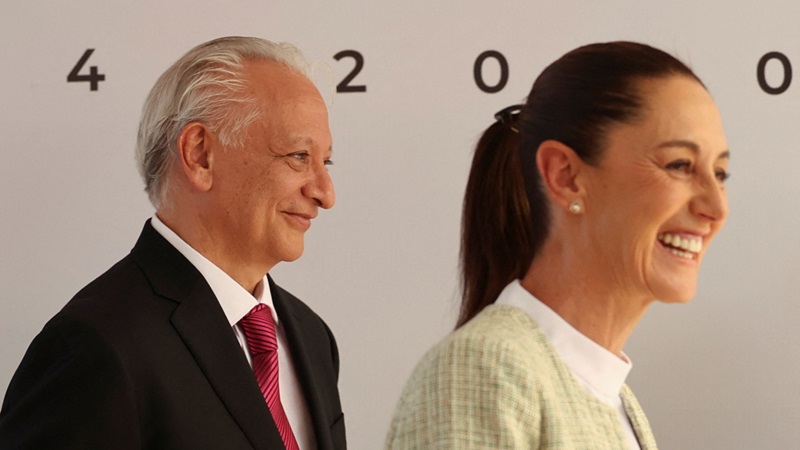Investing even more in oil and gas would be a huge financial risk so Claudia Sheinbaum should order Pemex to diversify
Fernanda Ballesteros leads the Natural Resource Governance Institute’s work in Mexico and is part of the organization’s energy transition coordination group.
Last week, Claudia Sheinbaum started her six-year term as Mexico’s president. Among great expectations for change, many are puzzling over how she might honour her background as a climate scientist while also upholding the legacy of her predecessor and ally Andrés Manuel López Obrador.
His administration doubled down on fossil fuel production and unconditionally picked up the tab for Pemex – Mexico’s national oil company – despite its debts exceeding $100 billion dollars, about 6% of Mexico’s Gross Domestic Product.
In her inauguration speech to Congress on Tuesday, Sheinbaum said: “National consumption will continue to be the fundamental objective of Pemex’s oil production, limited to production of 1.8 million barrels per day. We will promote energy efficiency and the transition to renewable energy sources to meet the growth in energy demand.” Can she and Mexico have their cake and eat it too?
Sheinbaum has pledged to make Mexico a global leader in the fight against climate change and a champion of the energy transition. But her green ambitions are possibly at odds with some of her election promises.
Japan backs fossil fuels in Southeast Asian “zero emission” initiative
One of them was making Mexico self-sufficient in gasoline, which would require major investments in Pemex’s refining capacity. To date, this has not been a fruitful pursuit: Pemex’s Deer Park and Olmeca refineries represent over 90% of Pemex infrastructure spending from 2019 to 2024, and it is uncertain when Olmeca will begin to operate at full capacity.
Considering that Pemex is the world’s most indebted national oil company and that its financial woes are well known among investors and the Mexican public, Sheinbaum and her officials must explain as soon as possible their plans and demonstrate that they are viable. Justified scepticism abounds.
In her favour, Sheinbaum has appointed an energy team including experts with a strong track-record of public service and good knowledge of the sector, such as the new energy minister and the CEOs of Pemex and the electricity commission. Here are three steps she and her team should take now to ensure that Mexico improves its fiscal health and embarks on a meaningful energy transition.
1.Reassess Pemex’s future production and business plans
According to our analysis, Pemex ranks 11th among the 58 national oil companiesin terms of financial risk from oil and gas assets that will lose value as the world transitions away from fossil fuels.
We found that approximately $10 billion in Pemex’s production assets would not break even under the IEA’s Announced Pledges Scenario. Pemex must recognise this risk, come up with a solid plan to mitigate it, and publish it widely.
Production has been dropping progressively since 2010 while also becoming more and more costly. Pemex has not been meeting its emission reduction targets and this is costing the company dearly in terms of access to finance and investor confidence.
Diversifying Pemex’s business can be a solution. But how and where to diversify must be technically and financially viable. For example, if Pemex eyes petrochemicals as an option, it must consider that only 12% of current hydrocarbons demand goes to this sector and many companies are already pursuing it.
2.Reduce Pemex’s operational greenhouse gas emissions
Despite a decline in overall production, emissions continue to rise significantly: 58% from 2012 to 2016 and 51% from 2018 to 2022. These spikes correlate with sharp rises in direct methane emissions, which tripled from 2012 to 2016 and nearly doubled from 2018 to 2022. These spikes correlate with sharp rises in direct methane emissions, which tripled from 2012 to 2016 and nearly doubled from 2018 to 2022.
Recent analysis from the Natural Resources Governance Institute (NRGI) suggests that accountability and governance are critical to achieve methane reductions. But the agencies that regulate Pemex have not had enough power to rein in the company. The new Government must empower the energy regulators to stand up to Pemex, have sufficient autonomy, capacity and budget to enforce the rules.
3. Develop and publish a full-scale energy transition plan
While her non-specific aspirations for a greener future seemed to resonate with voters, now that she is in office Sheinbaum must take a much more tactical and detailed position.
To achieve her climate and energy objectives, Sheinbaum will have to devise a credible and actionable strategy that phases out fossi
Read More

